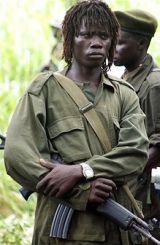Ugandan rebels leave bush despite ICC threat
Sept 2, 2006 (GULU, Uganda) — Lord’s Resistance Army rebels poured out of jungle hideouts in northern Uganda on Saturday, waving and smiling at locals as they trekked toward neutral camps under a less than week-old truce.
 Despite a warning that war crimes charges against their leaders will stay in place until a peace deal is signed, and rebel misgivings about the truce, LRA fighters were moving in significant numbers, residents and the military said.
Despite a warning that war crimes charges against their leaders will stay in place until a peace deal is signed, and rebel misgivings about the truce, LRA fighters were moving in significant numbers, residents and the military said.
“There is a good rebel response according to the information we have,” said Lieutenant Chris Magezi, the army spokesman for northern Uganda. “Many people have come to us and said they have seen them moving.”
Aid workers said groups of up to 100 rebels had been seen walking to locations from where they have been promised safe passage to two camps in south Sudan, while peace talks continue seeking to end the brutal, nearly 20-year war.
In one case, witnesses told AFP a group of LRA fighters had encountered a Ugandan army patrol but that both sides had stood down amicably, in accordance with the cessation of hostilities agreement that took effect on Tuesday.
“Everyone held their breath, but nothing happened as both sides waved to each other and the rebels moved further north,” said Jesse Kilama, who saw the tense situation unfold in Atiak, about 60 kilometers (37 miles) north of Gulu.
Magezi confirmed the Friday incident, saying the rebels had crossed paths with an army foot patrol “but were left to go” under the terms of the truce that gives them three weeks to make their way to the camps in Sudan.
The LRA fighters are to remain there for the duration of the peace talks being held in Juba, the capital of southern Sudan, under the mediation of that region’s autonomous government.
Since the truce came into force, the LRA has complained of numerous government violations, including requiring their forces, estimated to number between 500 and 5,000, to take specific paths to get to the two camps.
On Thursday, the rebels said fighters should not use the government-approved routes until further notice, but witnesss accounts in Gulu, the epicenter of the 19-year insurgency, appeared to indicate the corridors were being used.
The Juba negotiations that are due to resume next week are widely seen as the best chance to end the war in northern Uganda that has claimed tens of thousands of lives and displaced nearly two million people.
The conflict is regularly described by UN and aid workers as one of the world’s worst and most-forgotten humanitarian crises, with the area’s impoverished civilian population subjected to massive abuses and neglect.
Since it took leadership of a rebellion among the region’s ethnic Acholi minority in 1988, the LRA has been accused of horrendous atrocities, including massacres, mutilations, rapes and mass abductions.
Its main leaders, including the elusive supremo Joseph Kony, are charged with war crimes by the International Criminal Court but have been offered an amnesty by Ugandan President Yoweri Museveni should a peace deal be signed.
The Hague-based tribunal, the world’s first permanent war crimes court, has repeatedly said its charges, lodged last year after a request by Kampala, remain in place and that Uganda has an obligation to turn over indictees.
On Saturday, Museveni renewed the amnesty offer but said he would not ask ICC prosecutors to drop the charges unless a comprehensive settlement is reached, suggesting they are an incentive to the peace talks.
“The indictment should remain until Kony agrees to get out of his criminal activities,” he told reporters.
“Once Kony does that, we should dialogue with the ICC to inform them that we have an alternative solution to this problem and we would like them to leave these indictments,” Museveni said.
(ST/AFP)
